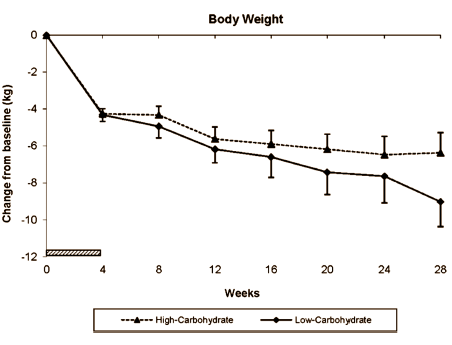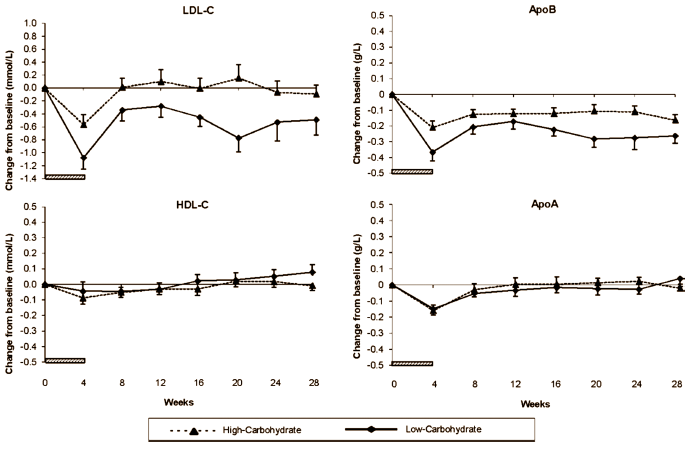OBJECTIVE:
Low-carbohydrate diets may be useful for weight loss. Diets high in vegetable proteins and oils may reduce the risk of coronary heart disease. The main objective was to determine the longer term effect of a diet that was both low-carbohydrate and plant-based on weight loss and low-density lipoprotein cholesterol (LDL-C).
DESIGN, SETTING, PARTICIPANTS:
A parallel design study of 39 overweight hyperlipidaemic men and postmenopausal women conducted at a Canadian university-affiliated hospital nutrition research centre from April 2005 to November 2006.
INTERVENTION:
Participants were advised to consume either a low-carbohydrate vegan diet or a high-carbohydrate lacto-ovo vegetarian diet for 6 months after completing 1-month metabolic (all foods provided) versions of these diets. The prescribed macronutrient intakes for the low-carbohydrate and high-carbohydrate diets were: 26% and 58% of energy from carbohydrate, 31% and 16% from protein and 43% and 25% from fat, respectively.
PRIMARY OUTCOME:
Change in body weight.
RESULTS:
23 participants (50% test, 68% control) completed the 6-month ad libitum study. The approximate 4 kg weight loss on the metabolic study was increased to -6.9 kg on low-carbohydrate and -5.8 kg on high-carbohydrate 6-month ad libitum treatments (treatment difference (95% CI) -1.1 kg (-2.1 to 0.0), p=0.047). The relative LDL-C and triglyceride reductions were also greater on the low-carbohydrate treatment (treatment difference (95% CI) -0.49 mmol/L (-0.70 to -0.28), p<0.001 and -0.34 mmol/L (-0.57 to -0.11), p=0.005, respectively), as were the total cholesterol:HDL-C and apolipoprotein B:A1 ratios (-0.57 (-0.83, -0.32), p<0.001 and -0.05 (-0.09, -0.02), p=0.003, respectively).
CONCLUSIONS:
A self-selected low-carbohydrate vegan diet, containing increased protein and fat from gluten and soy products, nuts and vegetable oils, had lipid lowering advantages over a high-carbohydrate, low-fat weight loss diet, thus improving heart disease risk factors.


